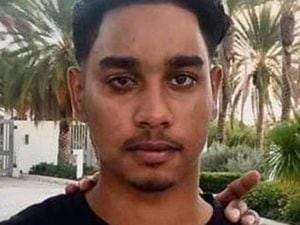Video gamer faked hostage situation that resulted in man being shot in the face
A British video game 'swatter' has been sentenced following an incident where an innocent man was shot in the chest and face by US law enforcement.
Watch more of our videos on Shots!
and live on Freeview channel 276
Robert Walker-McDaid, 28, from Coventry, claimed he had plastic explosives and hostages when he called the Maryland terrorism hotline as part of a 'swatting' prank aimed at victim Tyran Dobbs' home in America.
'Swatting' sees fake calls made to emergency services with the goal of 'pranking' a video gamer or social media streamer. Usually the act of 'swatting' includes calling police, SWAT, or terrorism hotlines or similar emergency services to warrant an armed or emergency response where the victim is consequently arrested.
The incident first started on February 17, 2015, with McDaid being contacted by Zachary Lee, of Catonsville, Maryland, whom he met online.
Lee told McDaid that he had "someone I need to be swatted" and shared the victim's address.
During the incident involving Mr Dodds', which took place on February 18, 2015, a day later, McDaid called overseas to the local Maryland terrorism hotline posing to be Mr Dobbs, telling the operator that he was armed and had three hostages.
Believing the threat was real, an armed Special Weapons and Tactics team (SWAT) raided Mr Dodds' house, resulting in him being shot in the face and chest with plastic bullets when they believed he was the person making the hostage and bomb threat.
Following the incident, Mr Dodds was left needing extensive reconstructive facial surgery as a result.
Now, after working closely with the U.S Department of Justice, the FBI and local agencies, as well as West Midlands Police’s Eastern Complex Team, McDaid was successfully sentenced to 20 months imprisonment, suspended for 18 months, at Warwick Crown Court, after earlier pleading guilty to one count of perverting the course of justice.
The case marked a major event in the British legal system, as McDaid had earlier become the first person to be charged in the UK with offences associated with 'swatting'.
Hannah Sidaway, specialist prosecutor for the Crown Prosecution Service West Midlands, said: "Swatting is far more than a crude prank – it is a serious crime which can have devastating consequences.
"Walker-McDaid may not have intended to cause such serious harm, but by sowing panic and deceiving law enforcement into responding to a fictitious threat, he left an innocent man with life-changing injuries.
"British-based offenders who hide behind online anonymity to commit serious crimes abroad will not escape justice, and we will continue to work collaboratively with international partners to ensure that perpetrators will face the full force of the law."
In January 2018, Lee was also sentenced to serve two years in prison in the US for his role in the incident.
Erek L. Barron, United States Attorney for the District of Maryland, said: "We will continue to use every tool at our disposal and work closely with our international partners to ensure that those who seek to harm Americans will face justice, wherever they may be."
Currently, the British legal system does not recognise 'swatting' as a standalone offence, however, as the United States does, the CPS worked closely with domestic and international partners to build the case against McDaid.





